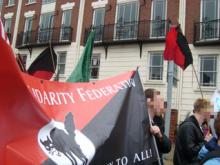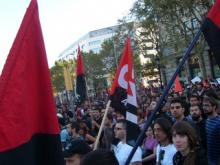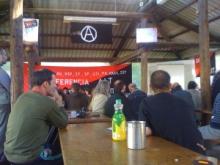Radical Workers’ Bloc calls for class war against capitalism & ConDem cuts
Today, over 4,000 people braved wind and rain to march and protest against the Lib Dems and the cuts agenda. It was a demonstration of the level of anger people feel – but also the willingness of their “leaders” to merely act as a safety valve, defusing that anger before it reaches the ruling class.
People assembled by the Anglican cathedral to march down to the docks where the protest was held. There were a number of trade union banners, as well as the banners of the Solidarity Federation and Anarchist Federation, whose membership made up theRadical Workers’ Bloc. Despite the rain, the huge turnout and musical accompaniments made it a lively atmosphere.
But whilst the spirit of the rank-and-file made the march vibrant, this was in spite the planning done by trade union leaders, not because of it.



